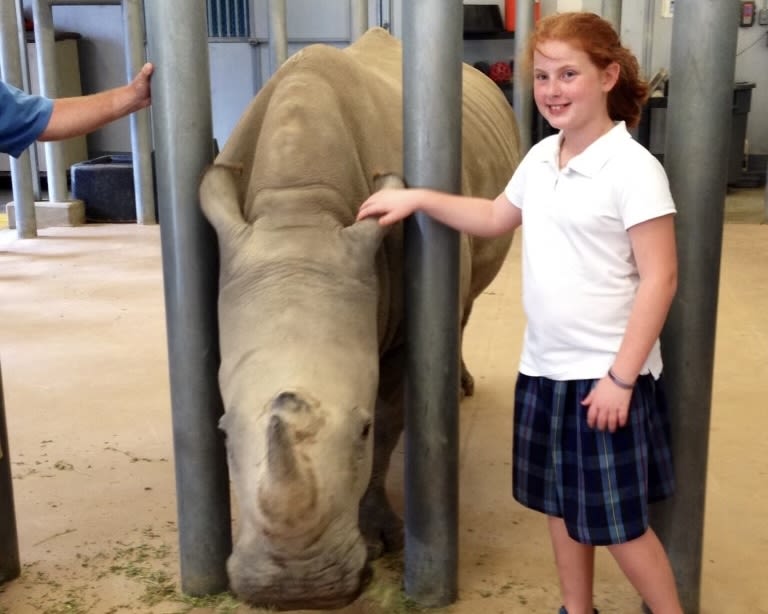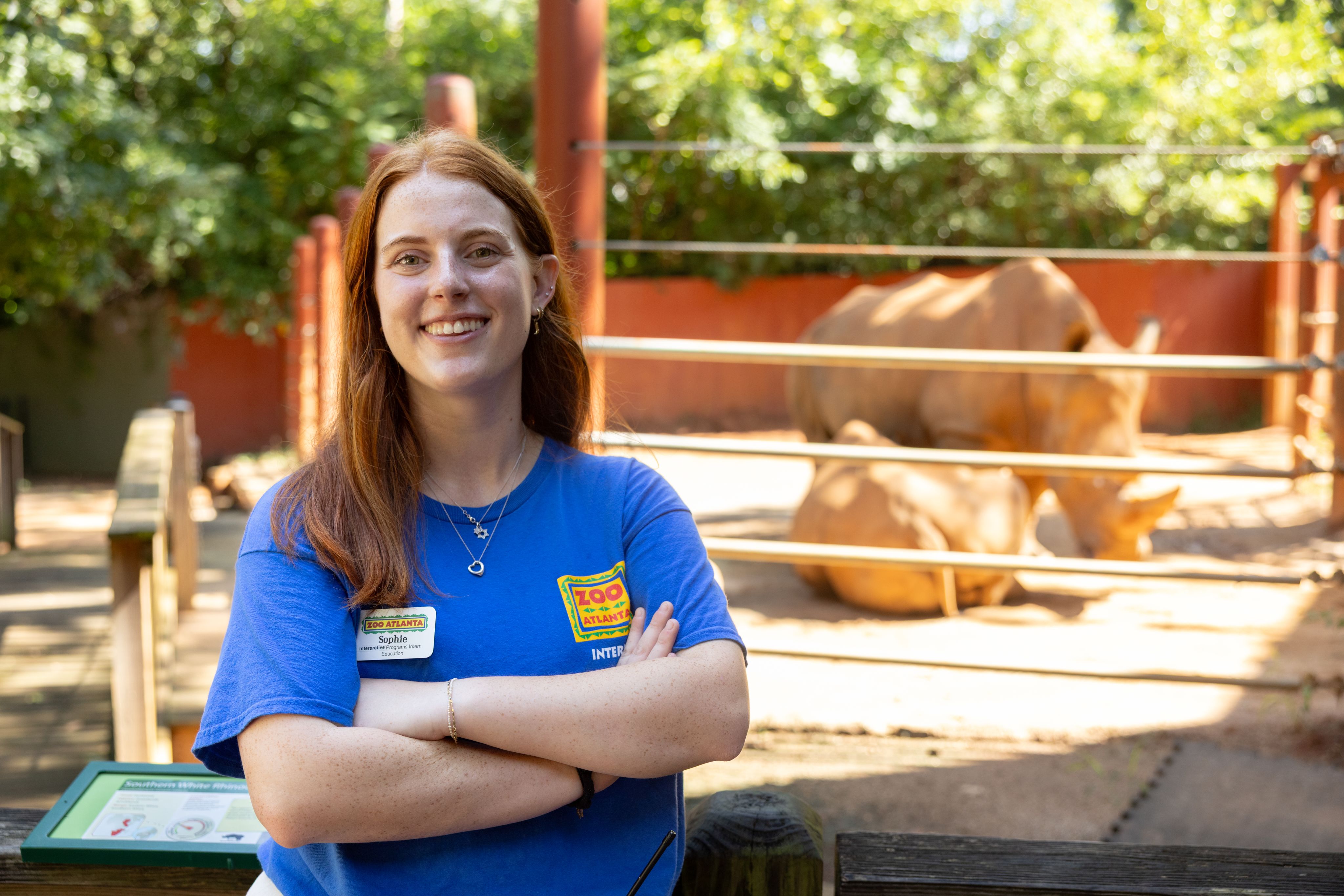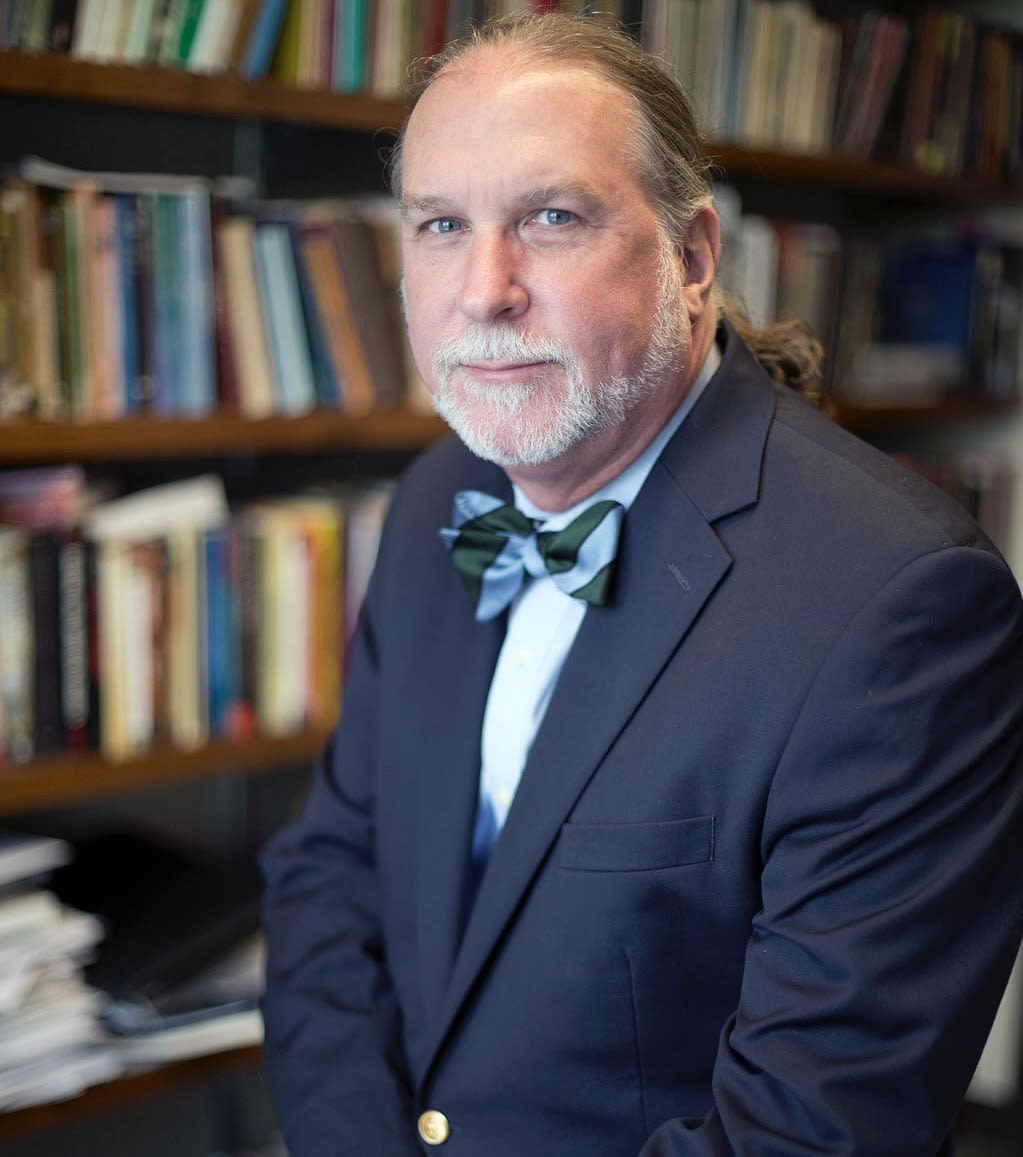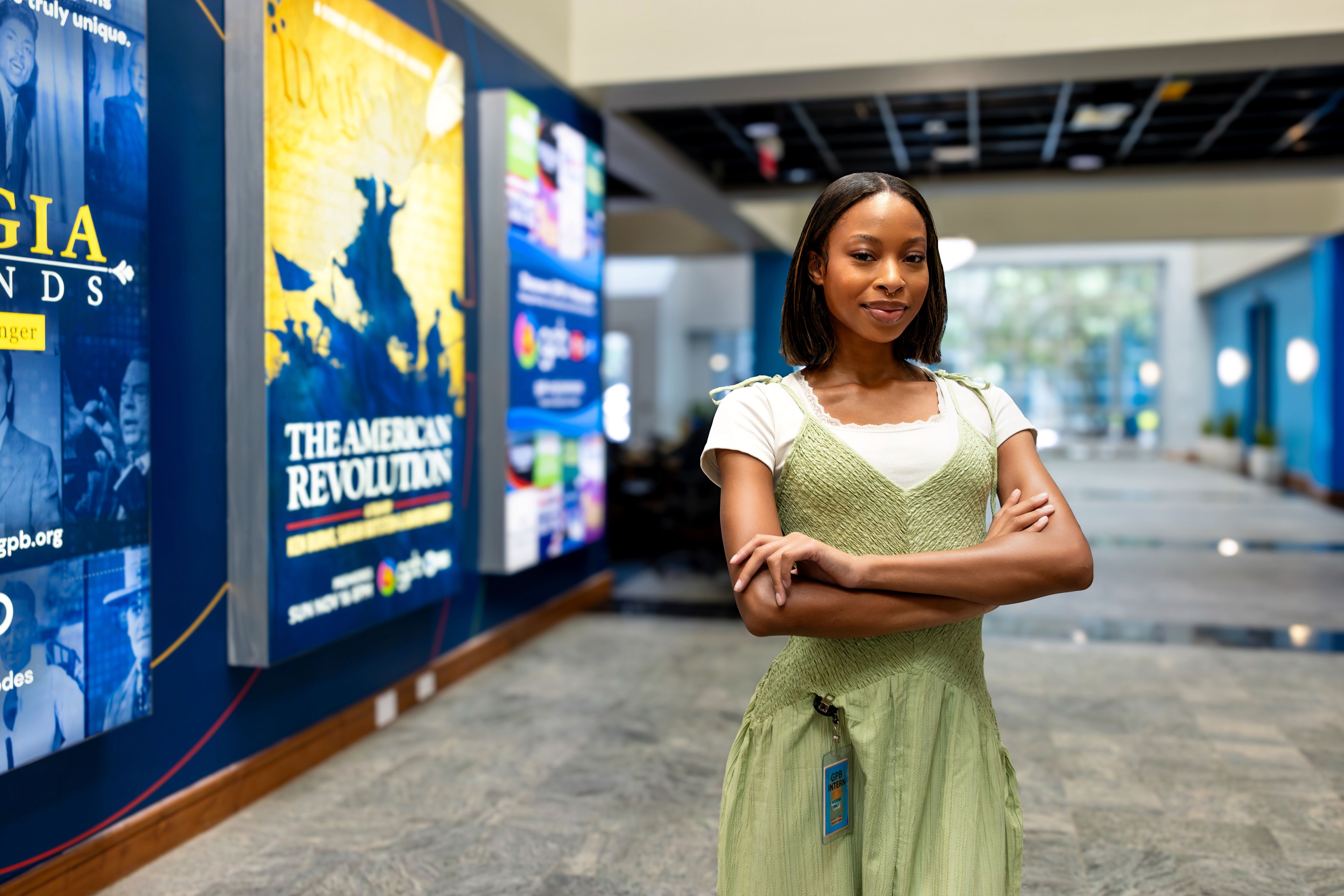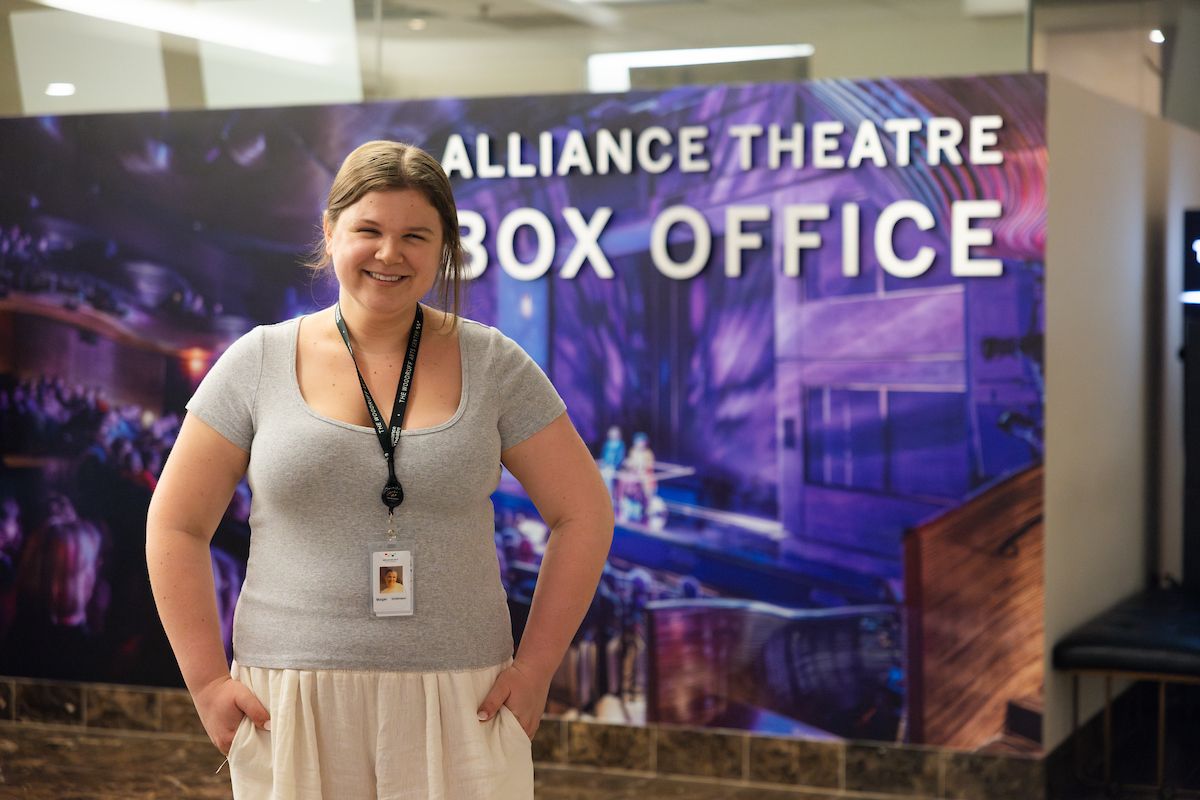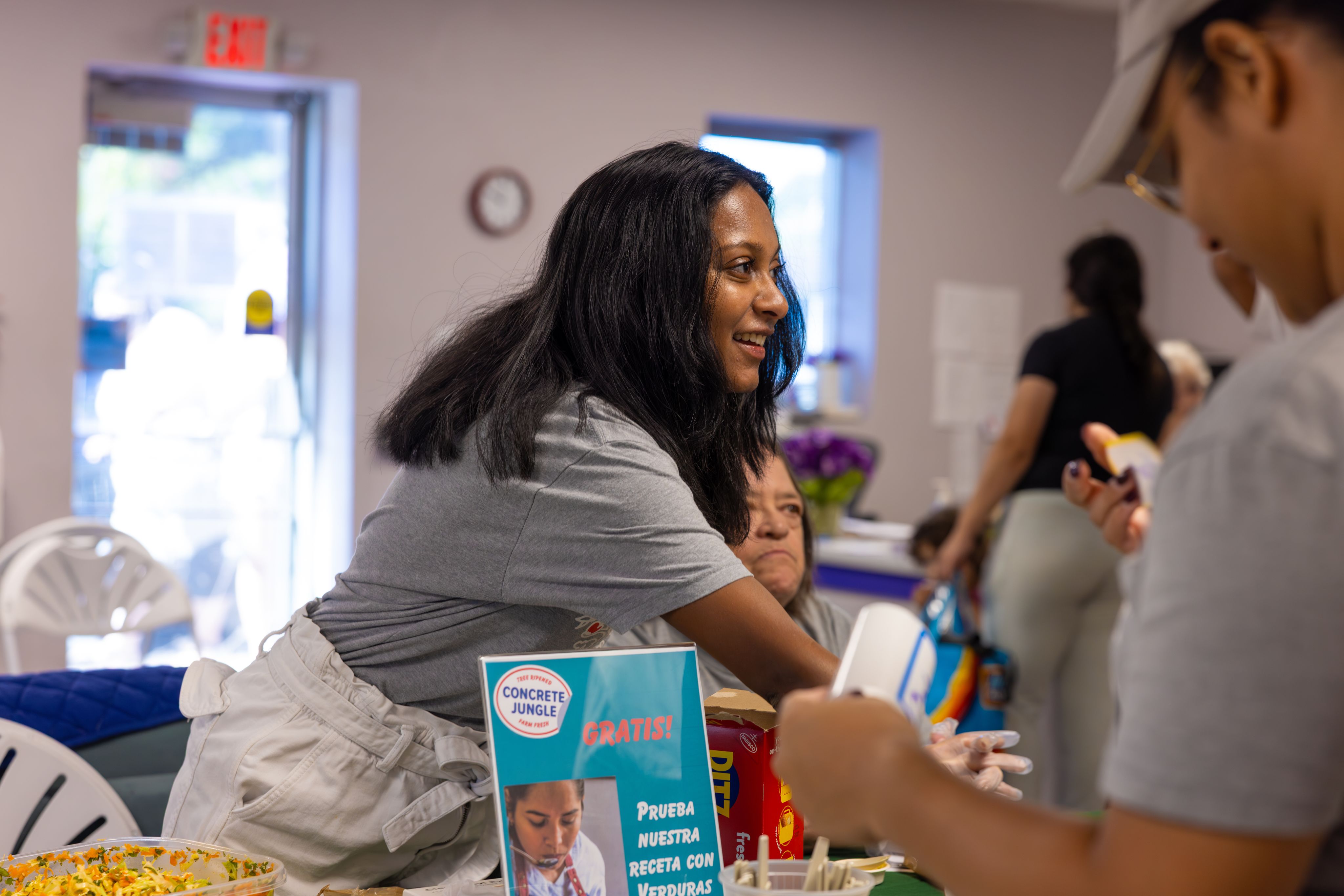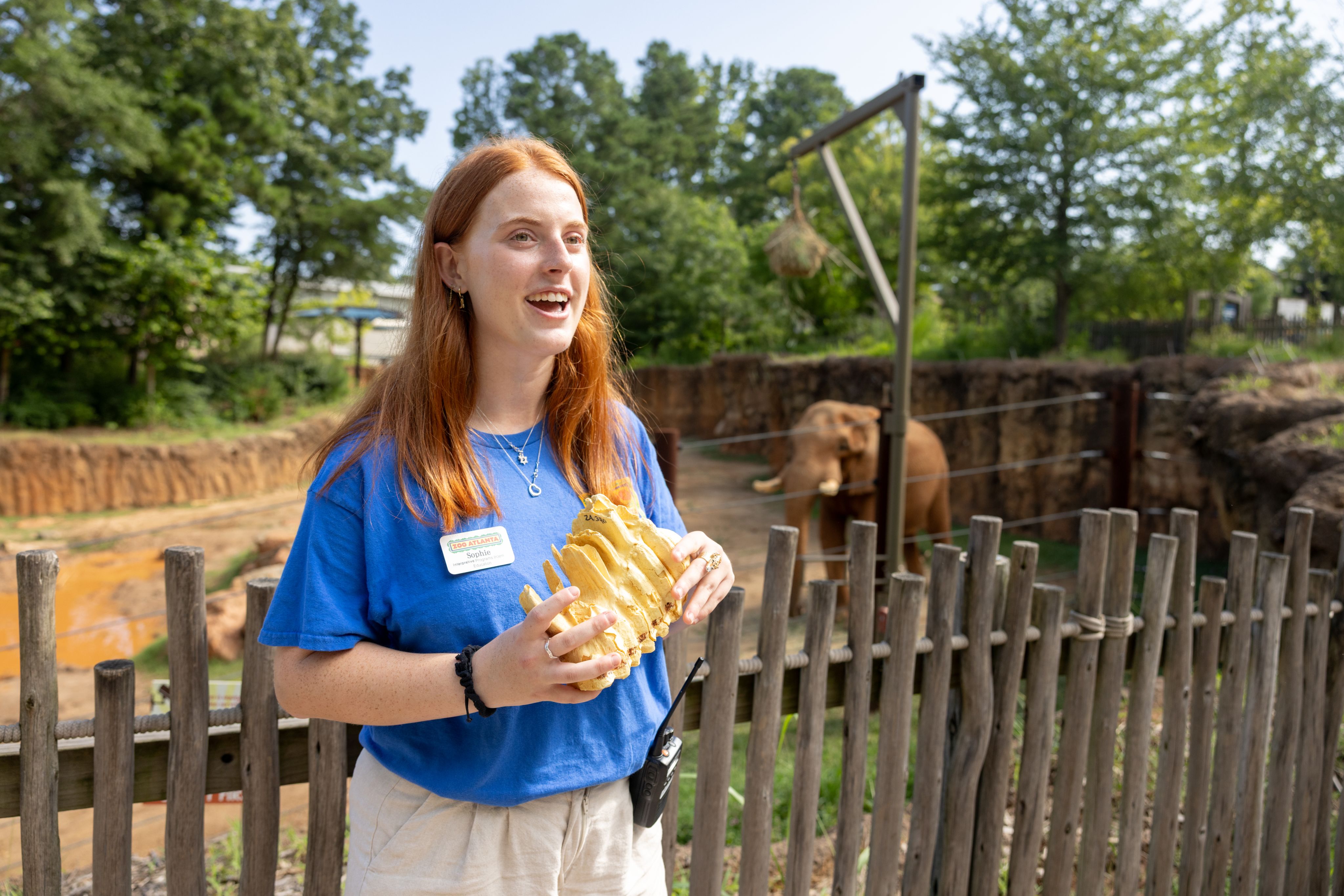Ethics in Action
Servant Leadership Summer interns learn to lead with purpose
Emory University | Aug. 6, 2025
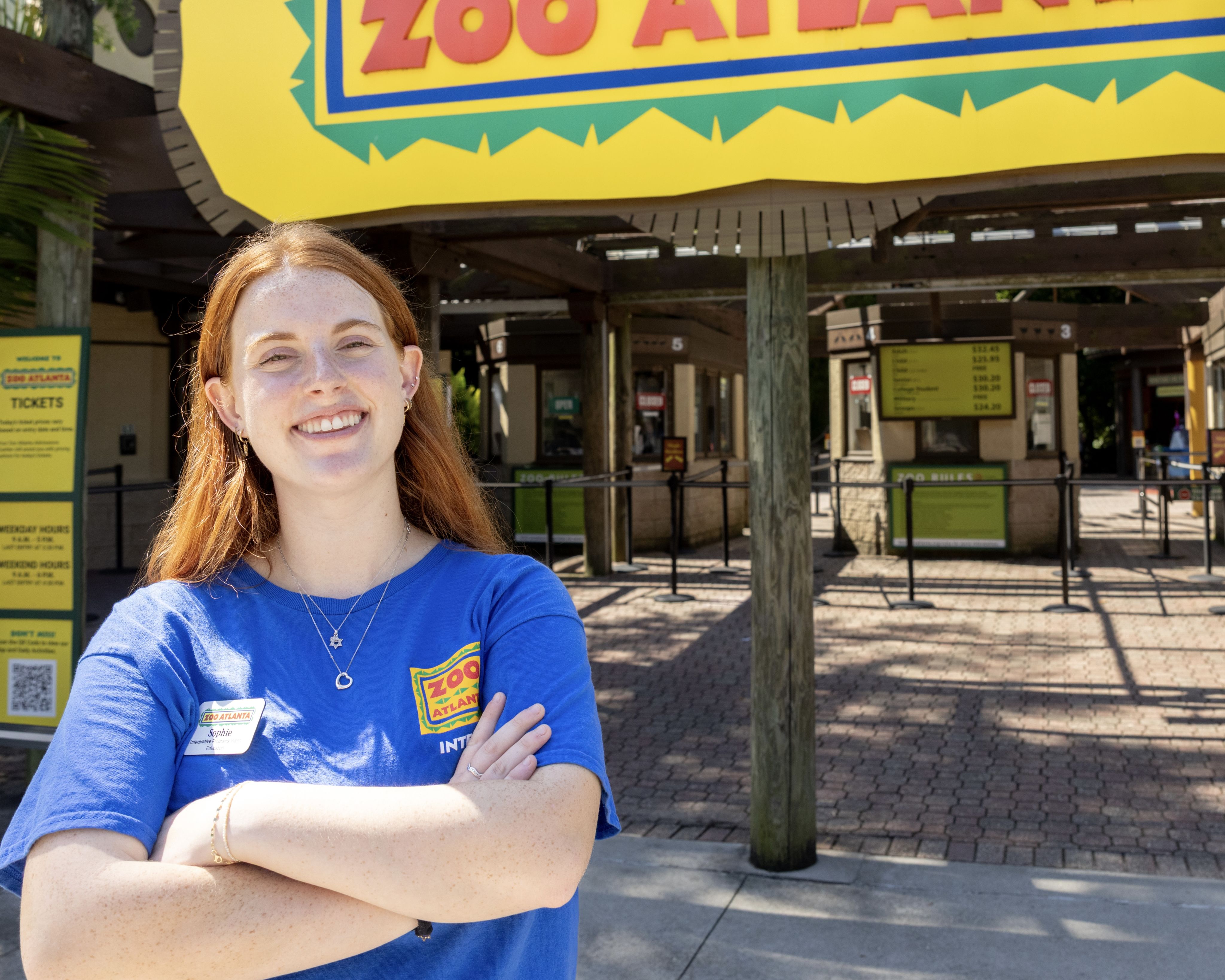
Emory senior Sophie Kalmin was a child when a rhinoceros sparked her life’s passion.
She grew up in Texas, where her grandmother took her on frequent trips to the Houston Zoo, including special events that allowed visitors to interact with the animals.
That’s where she met Mumbles, a southern white rhino.
“I fed the tigers and petted the otters and had all these really incredible experiences,” Kalmin recalls, brimming with enthusiasm, “but Mumbles just became my favorite.”
In 2020, Mumbles bid farewell to the Lonestar State and came to live at Zoo Atlanta.
Two years later, Kalmin came to Atlanta as an Emory student majoring in American studies and minoring in Middle Eastern and South Asian studies.
Kalmin reunited with Mumbles in May, when she began working at Zoo Atlanta through the D. Abbott Turner Program in Ethics and Servant Leadership (EASL) internship. The EASL internship program, now in its 26th year, is also known by its short name, Servant Leadership Summer.
Sophie Kalmin, age 10, posing with Mumbles the southern white rhino at the Houston Zoo, above. (Photo courtesy of Sophie Kalmin.) Below, Kalmin poses in front of Mumbles' calf, Zuri, and Zuri's mother, Kiazi, at Zoo Atlanta.
Sophie Kalmin, age 10, posing with Mumbles the southern white rhino at the Houston Zoo, above. (Photo courtesy of Sophie Kalmin.) Below, Kalmin poses in front of Mumbles' calf, Zuri, and Zuri's mother, Kiazi, at Zoo Atlanta.
Zoo Atlanta is one of 17 metro Atlanta organizations partnering with the Center for Ethics, which hosts the paid 10-week internships at local nonprofits, government agencies and socially responsible businesses connected to students’ passions.
As an intern in Zoo Atlanta’s education department, Kalmin shadows staff teaching visitors about the animals and the zoo’s conservation efforts. She also gets to visit with Mumbles, his calf, Zuri, and Zuri’s mother, Kiazi.
Mumbles moved from the Houston Zoo to Zoo Atlanta as part of the Association of Zoos and Aquariums' Species Survival Plan. Facing habitat loss and poaching for their horns, which are highly valued in some cultures for traditional medicine, southern white rhinos are listed as “Near threatened” by the International Union for Conservation of Nature.
At Zoo Atlanta, Mumbles shares a habitat with Kiazi, who is not close to him genetically. Genetic diversity improves the odds of healthy offspring.
Learning details about how zoos support species survival informs questions Kalmin’s American studies honors thesis is tackling: How have zoos evolved from mere places of entertainment to critical players in wildlife conservation, and how can they continue to make progress in conservation while also entertaining the public?
Kalmin hopes eventually to work in government affairs for a zoo-accreditation organization.
Connecting the classroom to the real world
Servant Leadership Summer’s classroom component challenges students to become true scholars of the nonprofit world, says Edward Queen, associate teaching professor at Emory Center for Ethics and director of the internship program. Students complete writing assignments and take part in weekly class discussions and lectures. They also give presentations at the program’s conclusion.
“Yes, if you are doing your work, you’ve got to do it well,” Queen says, “but what you really have to focus on is: What are you learning? What skills are you developing? What do you think about this organization?”
“I'm serving students,” says Edward Queen, “and I'm trying to kind of give them the most opportunities possible.” Photo by Bryan Meltz, Emory Photo/Video.
“I'm serving students,” says Edward Queen, “and I'm trying to kind of give them the most opportunities possible.” Photo by Bryan Meltz, Emory Photo/Video.
Each class begins with a debrief of the week. Queen asks students to consider highs and lows, challenges and takeaways.
“It’s fun,” says Kalmin, “because he’ll really push you to think more deeply about your experience.”
Discussions about ethical decision-making in nonprofit leadership can be spirited and complex, as students and Queen take on the real-life complications common to the work world.
Kalmin recalls the week Queen quizzed the 27-person class on the conditions under which they’d accept a donation on behalf of their nonprofit.
“So, considerations like: Does the donor want to remain anonymous?” explains Kalmin. “Does the donor align with your mission? Will this upset your board? Will you be able to continue functioning without this donation? Or, this donor doesn’t want to be anonymous, but they have a bad reputation. Do you still accept it? People might really disagree with each other, but they’re super engaged.”
One week, the group discussed attitudes toward AI. The next week, Emory graduate student Chizaram Anyaegbu attended a meeting devoted to that topic as part of her internship with Georgia Public Broadcasting (GPB), armed with insights from class.
Chizaram Anyaegbu, a graduate student at Rollins School of Public Health, says her internship at GPB has crystallized her career goals. Photo by Sarah Woods, Emory Photo/Video.
Chizaram Anyaegbu, a graduate student at Rollins School of Public Health, says her internship at GPB has crystallized her career goals. Photo by Sarah Woods, Emory Photo/Video.
‘To be a leader, you must serve’
Anyaegbu is pursuing a Master of Public Health degree with a concentration in behavioral, social and health education sciences at Rollins School of Public Health.
As the outreach intern at GPB’s community development department, she is helping publicize the station’s rollout of “Caregiving,” a documentary about the experiences of paid and unpaid caregivers.
Anyaegbu herself once worked as a caregiver for people with disabilities — an experience that sparked a passion for advocacy. She says she is “pleasantly surprised” that an internship at a public media station caters to her interest and career goals. “I’m also surprised by how much fun I’m having,” she adds.
She spent her summer developing a resource toolkit for Georgia caregivers that she shared online and at the station’s public forums — where she has had the opportunity to network with nonprofits focusing on disability services.
The internship’s emphasis on communications work has solidified her plan to pursue science education for public health.
“All the things are lining up,” she says, “and I’m so excited.”
Servant leadership may sound like a contradiction in terms, says Anyaegbu, but Servant Leadership Summer has deepened her understanding of its importance in public health.
“To be a leader, you must serve,” she says. “In my career, if I want to be an advocate for disabled people, I also have to know that I’m serving a community and meeting their needs.”
Shaping the next generation of leaders
Helping students find their fit in the nonprofit world is a critical component of the program, says Queen.
“My mission, really, is to shape the next generation of community leaders by stoking their passion for community service and giving them the skills to be successful at it, whatever they do, whether they run for school board or serve on the board of Boys and Girls Club,” he says.
Abrianna Belvedere, who graduated in 2022 with a bachelor’s degree in Theater Studies, says the program helped shape their understanding of how nonprofits operate.
“Learning what a board is and learning about development — and being able to articulate mission and values,” they say, “these are all essential parts of nonprofit leadership that can be opaque when you’re starting out. So, getting thorough, intentional training as an intern is a really special opportunity.”
Belvedere credits the paid Emory internship program as a key step toward their current role — BOLD producing associate at Alliance Theatre, in partnership with the BOLD Theater Women's Leadership Circle, which is dedicated to supporting the advancement of women and nonbinary individuals in the theater world.
“I would not have been able to pursue an unpaid internship,” they say, “but now I have a stable career in the arts because of EASL. I was able to keep the lights on the summer I was an intern because EASL truly prioritizes a sustainable internship experience. It is an ethical internship.”
Belvedere has come full circle, supervising this year’s Emory Servant Leadership intern at the Alliance — Morgan Schatmeyer, a junior majoring in theater studies and film and media studies.
Senior Morgan Schatmeyer's internship at Alliance Theatre includes doing dramaturgical work for "Fiddler on the Roof," which means researching the play's historical context and applying it onstage. Photo by Ava Lockhart, Emory Photo/Video.
Senior Morgan Schatmeyer's internship at Alliance Theatre includes doing dramaturgical work for "Fiddler on the Roof," which means researching the play's historical context and applying it onstage. Photo by Ava Lockhart, Emory Photo/Video.
Abby Balson, a senior majoring in human health and music, at a food distribution event with Concrete Jungle, which works to remove barriers to food access. She is interning in the organization's community outreach and education program. Photo by Sarah Woods, Emory Photo/Video.
Abby Balson, a senior majoring in human health and music, at a food distribution event with Concrete Jungle, which works to remove barriers to food access. She is interning in the organization's community outreach and education program. Photo by Sarah Woods, Emory Photo/Video.
As an intern, Kalmin shadows staff who teach visitors about the animals and the zoo’s conservation efforts. Here, she shares facts with guests about elephant digestion, using a model elephant tooth.
As an intern, Kalmin shadows staff who teach visitors about the animals and the zoo’s conservation efforts. Here, she shares facts with guests about elephant digestion, using a model elephant tooth.
Learning while having fun
Kalmin also cites the novel learning opportunities of the internship program, including attending training sessions on creating meaningful visitor experiences.
She carries a notebook to write down all the animal facts she learns daily at Zoo Atlanta.
“I’m just having the best time,” she says. “I mean, people always ask me why I love zoos so much. All I say is, they’re so cool! No better word for it.
“Like, just now? I was at the sun bear habitat, learning everything I could about them, and they were wrestling. So, I’m in the city of Atlanta, and I’m watching bears wrestle. What could be cooler?”

Story and design by Kate Sweeney. Photos by Avery Spalding of Emory Photo/Video, except as noted.
To learn more about Emory, please visit:
Emory News Center
Emory University


